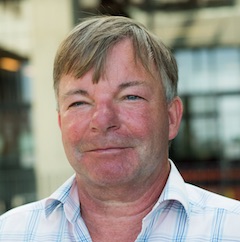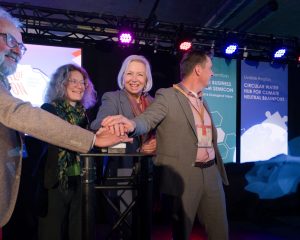SmartTwo+: a maverick collaboration in telecoms
In the Eindhoven Engine project SmartTwo+, KPN and TU Eindhoven collaborate on maverick telecom technologies for the societal challenges of mobility, safety and smart cities. This is where Nico Baken feels at home: as a professor in TU/e’s Electro-Optical Communication group, he’s also spent almost 40 years carrying out fiber-optic research for KPN. In this article, he discusses what Eindhoven Engine’s multidisciplinary approach means to the project.
The need to build bridges
“KPN formally had a lab of their own. In the sixties, there were over 600 people,” begins Nico. “KPN had the UMTS [Universal Mobile Telecommunications System] auctions in July 2000 and discovered in late autumn that they had made a huge mistake and were bankrupt. On 1 January, they sold the laboratory to TNO for one euro. That had quite some consequences. First, we didn’t get an influx of new people from the lab to the operational organization. Second, the connections with the universities were much less strong – there were only a few people left who could even communicate with them.”
This difficult situation led to the formation of Flagship Telecom in 2017, a partnership between KPN and TU/e on areas like software, data analytics and AI. This actively seeks out collaboration and was also the origin of predecessor project SmartOne. “I’m trying to build bridges between KPN and the university, but also inter-faculty,” Nico explains. “One of the points of the Engine is that you get interdisciplinary connections – whether these are between sectors, faculties or companies. Maarten Steinbuch believes in this.”
Mr. Smart City
Another key alignment is Eindhoven Engine’s focus on accelerating the technology-readiness levels of potential applications. “It would be nice to have senior researchers from TU/e in combination with senior people from companies,” continues Nico, “and I hope that the PhDs will be able to make the whole more than the sum of the parts. A lot of contact is needed for that. That’s why it’s good that you have room where all these PhDs come together.
“One of the points of the Engine is that you get interdisciplinary connections.”
In the ongoing pandemic, Eindhoven Engine’s trademark co-location has often had to move to the virtual world, but Nico sees a positive side to this: “KPN could have done any advertisement campaign for Zoom but it wouldn’t have worked as well as corona. That’s a big change. When it’s over, many more people will work from home.”
Alongside ad hoc meetings, the project members hold KPN-organized plenary meetings each quarter and an annual general meeting which includes TU Delft. Regular contact within the project is vital as it provides greater empathy for different perspectives, as seen in disagreements on the smart city element. Nico: “The students regarded me as Mr. Smart City but the first question I asked is do we really want to live in cities? They didn’t like that! The tipping point is 2060, when the world population will decline. We still have some 40 years to think about how we truly want to live.”
Breaking out of silos
A final ingredient is challenge-based learning, in which knowledge is gained by tackling real-world issues. One of the project’s two PDEngs, for instance, is titled Traffic flow modeling and control in a smart city environment and has led to a spin-off mobility project with Utrecht municipality. As the SmartTwo+ network continues to grow, Nico sees opportunities to further revolutionize its methods of collaboration.
“I hope to give the participants more than content: awareness of the integral systemic impact they can have. Of course, the technological developments will need to contribute to sustainability and comfort for all people. But the difficulty at KPN is finding people who have a passion for being a coach to PhDs and PDEngs. You need continuity, so why not reverse the formula? Money and coaches are now coming to the university from KPN, but we could also get some professors for half a year. That’s really forming bridges. If humankind doesn’t make it, it will be because we stayed in silos.”

